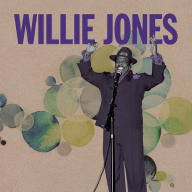Biographical research done by the Jazz Institute of Chicago is one source of more detailed description concerning what this man named Jones could supposedly do with a piano. He could run chordal bass lines at twice the speed of the blind genius George Shearing. He could play so hard that an upright piano would literally vibrate, appearing to be floating off the bandstand. Avant-garde jazz pianist Andrew Hill appraised Jones as a player who had absorbed funky organ music as well as the most advanced classical composition, a kind of early Cecil Taylor -- early enough, apparently, to have been somebody whose fingers were watched carefully by a young Sun Ra.
Jones' career took off in Chicago in the second half of the '40s. His first recording sessions were with alto saxophonist Buster Bennett, quickly followed by involvements with the band of vocalist and trumpeter King Kolax. Through the '50s he most likely played at any Chicago club that would possibly hire a pianist as well as for just about any independent recording company that would do likewise. He had occasional chances to lead his own sessions, such as a Vee-Jay production in the summer of 1954 that seems somewhat casual in nature, if titles of compositions are any indication. Jones does My Thing, then My Other Thing, leading to Willie's Blues and an equally possessive contribution from bassist Betty Dupree, Betty's Mambo.
As was typically the case on the Chicago scene, labels that recorded jazz and blues also cut doo wop and vocal group records, an aspect of the Jones discography in which any piano wrecking was kept to a minimum. Jones himself was said to be a good singer who often vocalized in his nightclub acts but never opened his mouth in the recording studio, at least not with the intention of singing. Taking a drink was another matter. The pianist's reputation as a drunk was almost second to none on the Chicago scene and that might have been a case of whoever was making the judgment seeing double. Pundits have indicated that all this sipping was the reason that Jones is poorly represented on record, although that doesn't account for all the drunken piano players who do have large discographies. At any rate, Jones continued earning at least a few thousand bucks every year as a pianist in Chicago into the early '70s. He died of arteriosclerotic cardiovascular disease on the last day of 1977. ~ Eugene Chadbourne, Rovi












